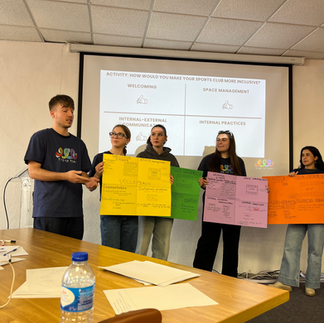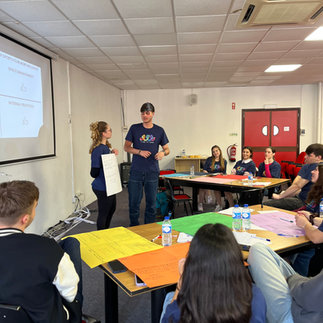🟣 Lisbon Transnational Meeting: the TIME TO TEAM journey took off
- ttt
- 21 mag 2025
- Tempo di lettura: 3 min
Aggiornamento: 17 giu 2025
In April 2025, the TIME TO TEAM project officially took off with its first transnational meeting, held in Lisbon and hosted by the Portuguese partner CDES Miguel Torga. Over two days of intense work and dialogue, the organisations from Italy, Portugal and Bulgaria laid the foundations for a shared educational and social mission: making team sports more inclusive for transgender people.
TIME TO TEAM is co-funded by the European Union under the Erasmus+ Sport programme, and aims to equip sport organisations with the tools, knowledge and sensitivity needed to welcome diversity and promote respect.
Working together for a common goal
The meeting opened with each partner presenting the current challenges and realities faced by transgender people in sport in their own country. These inputs allowed the group to co-construct a common understanding of the problem, grounded in real-life experiences, statistics, and a strong sense of urgency.
Throughout the meeting, the group co-designed the methodology and training structure that will guide local workshops in each country. These workshops will target coaches, sport managers and youth workers, and will combine theory, practical tools and emotional awareness to foster inclusive environments in team sports.
What the training will include
The partners worked together to define the core content of the training sessions. The sessions will cover:
What it means to be transgender: identity development, personal stories, and stereotypes.
The condition of transgender people worldwide: data, rights denied, and barriers in sport.
Inclusive language: key LGBTI+ terminology and how to use it respectfully.
The benefits of sport: how physical activity supports mental wellbeing and social inclusion.
Communication skills: how to welcome and listen to a transgender person, what to promote and what to avoid.
Inclusive practices: how to design team activities, manage registration forms, address privacy, and adapt logistics (changing rooms, uniforms, travel, etc.).
What participants will learn
During the meeting, partners also drafted the expected learning outcomes of the training. Participants will:
Understand the concepts of duty bearers and rights holders, and the responsibility that sport managers have in protecting the rights of transgender people.
Learn how to communicate inclusively, welcome a transgender person respectfully, and design inclusive registration forms.
Discuss how to handle privacy and data management of transgender members.
Explore how to manage logistical aspects such as locker rooms, uniforms, and team travel.
Learn how to respond supportively when a transgender person chooses to open up, avoiding minimisation or judgement.
Understand the harm of any attempt—intentional or not—to change someone’s identity.
Develop the ability to design inclusive activities and training sessions that prevent embarrassment or exclusion.
Learn how to promote inclusion through sport, recognising its role as an educational and transformative tool.
A strong and promising start
The Lisbon meeting was not just an administrative milestone. It was a space of connection, empathy and shared responsibility. It gave life to a project that is ambitious, necessary and rooted in the real needs of people and communities.
From now on, each partner will implement the first local workshops and start collecting experiences and feedback from participants. These local activities will feed into the next international steps and, ultimately, into the final practical guide for inclusive sport organisations.
The TIME TO TEAM journey has begun—with people, stories, and values at its core.




















